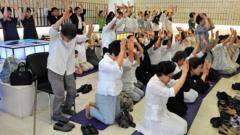A Tokyo court has ordered the dissolution of the Unification Church in Japan, a move that comes after increasing criticism of the group, particularly following the assassination of former Prime Minister Shinzo Abe in 2022. The court's decision was influenced by the alleged assassin's claim that his grievances towards Abe were tied to the church, which he accused of leading his family into financial ruin.
The Japanese Ministry of Education and Culture had previously sought the church's dissolution, alleging that it engaged in manipulative practices by coercing followers into making substantial financial contributions. While the church vehemently defends these donations as part of its religious activities, the ruling strips it of its tax-exempt status and demands it liquidate its assets, despite allowing the organization to continue its operations within Japan.
Authorities conducted a thorough investigation, consulting nearly 200 individuals who reported being victimized by the church's practices, which included emotional coercion to purchase high-priced items linked to their spiritual health. The Unification Church, founded in South Korea during the 1960s, has faced controversies for its teachings emphasizing marriage as critical to spiritual salvation and conducting mass wedding ceremonies for thousands of couples.
The backlash against the church escalated in 2023 when around 200 former members sought compensation, collectively demanding 5.7 billion yen (approximately $38.5 million) due to perceived financial exploitation. Further investigations unveiled extensive connections between the church and prominent members of Japan's ruling Liberal Democratic Party (LDP), leading to the resignation of several ministers. An internal review within the LDP disclosed that 179 of its 379 lawmakers had interacted with the church, including attending events and receiving donations, further igniting public outrage over the organization's influence.

















